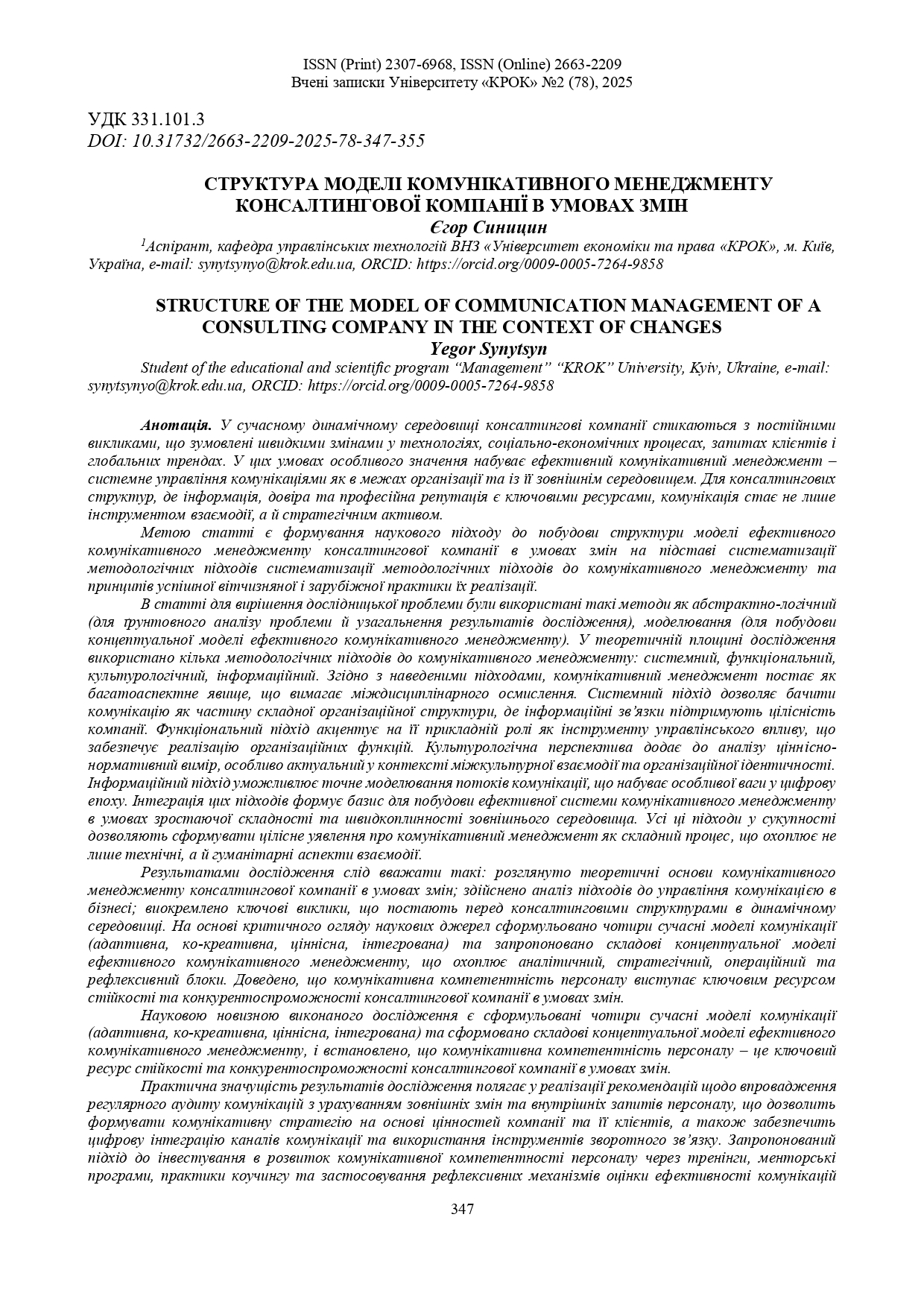СТРУКТУРА МОДЕЛІ КОМУНІКАТИВНОГО МЕНЕДЖМЕНТУ КОНСАЛТИНГОВОЇ КОМПАНІЇ В УМОВАХ ЗМІН
DOI:
https://doi.org/10.31732/2663-2209-2025-78-347-355Ключові слова:
комунікативний менеджмент, консалтинг, зміни, стратегія, модель, комунікативна компетентністьАнотація
У сучасному динамічному середовищі консалтингові компанії стикаються з постійними викликами, що зумовлені швидкими змінами у технологіях, соціально-економічних процесах, запитах клієнтів і глобальних трендах. У цих умовах особливого значення набуває ефективний комунікативний менеджмент – системне управління комунікаціями в межах організації та з її зовнішнім середовищем. Для консалтингових структур, де інформація, довіра та професійна репутація є ключовими ресурсами, комунікація стає не лише інструментом взаємодії, а й стратегічним активом.
Метою статті є дослідження теоретичних засад і практичних особливостей комунікативного менеджменту в консалтингових компаніях в умовах змін, а також узагальнення підходів до ефективного управління комунікаціями у даному контексті.
В статті для вирішення дослідницької проблеми були використані такі методи як абстрактно-логічний (для ґрунтовного аналізу проблеми й узагальнення результатів дослідження), моделювання (для побудови концептуальної моделі ефективного комунікативного менеджменту). У теоретичній площині дослідження використано кілька методологічних підходів до комунікативного менеджменту: системний, функціональний, культурологічний, інформаційний. Згідно з наведеними підходами, комунікативний менеджмент постає як багатоаспектне явище, що вимагає міждисциплінарного осмислення. Системний підхід дозволяє бачити комунікацію як частину складної організаційної структури, де інформаційні зв’язки підтримують цілісність компанії. Функціональний підхід акцентує на її прикладній ролі як інструменту управлінського впливу, що забезпечує реалізацію організаційних функцій. Культурологічна перспектива додає до аналізу ціннісно-нормативний вимір, особливо актуальний у контексті міжкультурної взаємодії та організаційної ідентичності. Інформаційний підхід уможливлює точне моделювання потоків комунікації, що набуває особливої ваги у цифрову епоху. Інтеграція цих підходів формує базис для побудови ефективної системи комунікативного менеджменту в умовах зростаючої складності та швидкоплинності зовнішнього середовища. Усі ці підходи у сукупності дозволяють сформувати цілісне уявлення про комунікативний менеджмент як складний процес, що охоплює не лише технічні, а й гуманітарні аспекти взаємодії.
Результатами дослідження слід вважати такі: розглянуто теоретичні основи комунікативного менеджменту консалтингової компанії в умовах змін; здійснено аналіз підходів до управління комунікацією в бізнесі; виокремлено ключові виклики, що постають перед консалтинговими структурами в динамічному середовищі. А на основі критичного огляду наукових джерел сформульовано чотири сучасні моделі комунікації (адаптивна, ко-креативна, ціннісна, інтегрована) та запропоновано концептуальну модель ефективного комунікативного менеджменту, що охоплює аналітичний, стратегічний, операційний та рефлексивний блоки. Доведено, що комунікативна компетентність персоналу виступає ключовим ресурсом стійкості та конкурентоспроможності консалтингової компанії в умовах змін.
Науковою новизною виконаного дослідження є сформульовані чотири сучасні моделі комунікації (адаптивна, ко-креативна, ціннісна, інтегрована) та сформовано концептуальну модель ефективного комунікативного менеджменту, і встановлено, що комунікативна компетентність персоналу – це ключовий ресурс стійкості та конкурентоспроможності консалтингової компанії в умовах змін.
Практична значущість результатів дослідження полягає у реалізації рекомендацій щодо впровадження регулярного аудиту комунікацій з урахуванням зовнішніх змін та внутрішніх запитів персоналу, що дозволить формувати комунікативну стратегію на основі цінностей компанії та її клієнтів, а також забезпечить цифрову інтеграцію каналів комунікації та використання інструментів зворотного зв’язку. Запропонований підхід до інвестування в розвиток комунікативної компетентності персоналу через тренінги, менторські програми, практики коучингу та застосовування рефлексивних механізмів оцінки ефективності комунікацій дозволить коригувати стратегії у реальному часі. Реалізація цих рекомендацій сприятиме підвищенню ефективності управління комунікаціями та забезпечить сталий розвиток консалтингової компанії в умовах нестабільності.
Напрямком подальших прикладних досліджень є розробки інструментів вимірювання ефективності комунікацій у консалтинговому середовищі.
Завантаження
Посилання
Алькема В.Г., & Сумець О.М. (2025) Алгоритм реалізації комунікативної стратегії в управлінні діловою репутацією підприємства. Ефективна економіка, (2) https://doi.org/10.32702/2307-2105.2025.2.1
Виноградова О.В., & Євтушенко Н.О. (2018) .Концептуальна модель консалтингової взаємодії підприємств. «Економіка. Менеджмент. Бізнес» № 1 (23), С.20-26 https://journals.dut.edu.ua/index.php/emb/article/view/1810/1720
Гудзь О. Є., & Маковецька І. М. (2021). Комунікаційний менеджмент: навчальний посібник. Львів : «Галицька видавнича спілка». С. 6-7
Василів Б. В. (2008). Інформаційні системи в менеджменті. Інтерактивний комплекс навчально-методичного забезпечення. Рівне: НУВГП, 167 с.
Верескун М. В. (2015). Методи оцінки ефективності впровадження інформаційних систем на промислових підприємствах. Теоретичні і практичні аспекти економіки та інтелектуальної власності. Маріуполь,. Вип. 1 (11), Т. 1. С. 21-27.
Гранат О. В. (2013). Принципи та підходи до оцінки комунікаційних систем підприємств аграрного сектора. Економіка та держава. № 4. C. 68-70.
Васильченко М.І., & Гришко В.В. (2018). Комунікативний менеджмент: навчальний посібник. Полтава: ПолтНТУ. 208 с.
Drucker, P. (2006). The Effective Executive: The Definitive Guide to Getting the Right Things Done. HarperBusiness.
Kotler, P., & Keller, K. L. (2016). Marketing Management (15th ed.). Pearson Education.
Robbins, S. P., & Coulter, M. (2022). Management (15th ed.). Pearson.
Heath, C., & Heath, D. (2007). Made to Stick: Why Some Ideas Survive and Others Die. Random House.
Christensen, C. M., Wang, D., & Van Bever, D. (2013). Consulting on the Cusp of Disruption. Harvard Business Review.
Argenti, P. A. (2021). Corporate Communication (7th ed.). McGraw-Hill Education.
Sinek, S. (2009). Start With Why: How Great Leaders Inspire Everyone to Take Action. Portfolio.
Рожко, О. В. (2021). Сутність та структура стратегічного комунікативного менеджменту. Вісник економіки транспорту і промисловості, №76, с. 103–110.
Пономаренко, Т. І. (2020). Цифрова трансформація комунікацій у бізнес-середовищі. Менеджмент та підприємництво в Україні: етапи становлення і проблеми розвитку, №1, с. 45–52.
Мельник, О. Г. (2022). Комунікативна компетентність як чинник ефективності консалтингових послуг. Наукові праці НУОУ, №2, с. 88–93.
Гетьман О.О., (2019) Сучасна концепція стратегічного управління Управлінська діяльність: Досвід, тенденції , перспективи. Збірник наукових праць Харківського національного університету будівництва та архітектури. С.4
Мінцберґ Г. (2018). Анатомія менеджменту. Ефективний спосіб керувати компанією / перекл. з англ. Р. Корнути. Київ: Наш Формат, 408 с.
Гудзь О. Є., & Маковій В. В. (2019). Концептуальні основи формування інформаційної політики підприємств. Науковий вісник Ужгородського національного університету. Міжнародні економічні відносини та світове господарство. Випуск 23 (1). С.65-69
Денисюк С. Г. (2012).Культурологічні виміри політичної комунікації: монографія [Текст]. Вінниця : ВНТУ, 396 с
McKinsey & Company - https://unija.com/en/m-a-buying-selling-company/?gclid=CjwKCAjwravBBhBjEiwAIr30VHEjbX9P9lHV0Uy82xdkkKpFoD5Cg5hL6QRjn7EAK6rR3qfJycmy9xoCzvgQAvD_BwE
Boston Consulting Group (BCG) - https://www.everstream.ai/special-reports/2025-supply-chain-annual- riskreport/?utm_medium=ppc&utm_source=google&utm_campaign=2025%20annual%20risk%20report&utm_content=special%20report&_bt=731993908990&_bk=climate%20risk&_bm=b&_bn=g&_bg=174618016036&gad_source=1&gad_campaignid=22204439654&gbraid=0AAAAADNNKtHtvjWmDW-azUYAHG-9GWtUx&gclid=CjwKCAjwravBBhBjEiwAIr30VF_8SKQhHgY1hHUlJn90e_dCCaPzPa-GLp6ausaFt6qeVApuODoRyhoCJYwQAvD_BwE
Deloitte - https://www.linkedin.com/company/deloitte
Bureau Business Ideas – https://bureaubusinessideas.com/uk/
Pro.mova – https://promova.com/uk/free-for-ukraine

Downloads
Опубліковано
Як цитувати
Номер
Розділ
Ліцензія

Ця робота ліцензується відповідно до Creative Commons Attribution-NonCommercial 4.0 International License.

